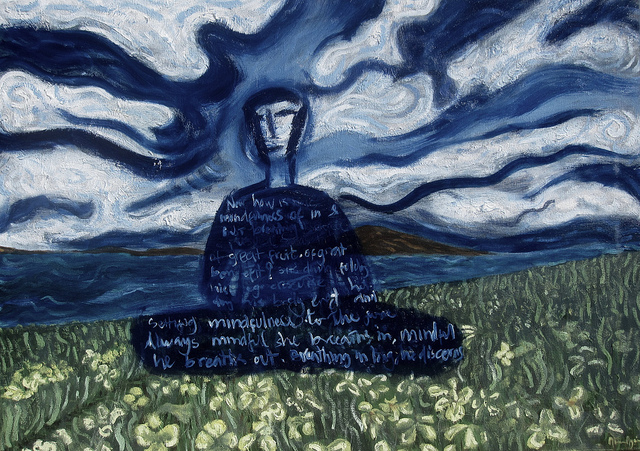
**Para leerlo en español, haga clic aquí.
These questions and answers may serve as a guide for those curious about meditation—new and experienced— and offer some cutting edge scientific findings on what happens to the brain during meditation.
Q: What is meditation?
A: The English word meditation is derived from the Latin verb meditari, meaning “to think, contemplate, or ponder.” Meditation is a practice of non-judgmental awareness—or mindfulness— of the present moment. It can be done lying down, sitting, walking or standing.
You do not have to be at a monastery to meditate! You can meditate where you are right now, even if that is on the toilet! But historically, meditation has been linked to religious contexts in Hinduism, Buddhism, Christianity, Judaism, Islam, etc. It has been done for thousands of years.
The breath is a good, time-tested anchor for quieting the mind and being present. Pay attention to the breath as an observer. Thoughts and feelings will come up, but do not cling to them or think about them too much. Just see what is going on in your body as is.
Meditation is natural and pure.
Q: What are the conditions helpful to meditation?
A: Most important is the desire or intention to understand the mind. A quiet, safe place will help to settle the mind and thus reveal its nature.
Q: What are the benefits of meditation?
A: With the practice of meditation, a sense of well-being and calm arises. Stress decreases and outside problems feel more manageable and less overwhelming.
There is scientific evidence that meditation increases grey matter in the brain, which is related to perception, body awareness, pain tolerance, emotion regulation, introspection, complex thinking and sense of self.
During meditation, the Anterior Cingulate Cortex (ACC) and hippocampus light up on brain scans. The ACC is deep inside the forehead behind the brain’s frontal lobe. It is responsible for self-regulation, purposefully directing attention and behavior, suppressing impulses and enabling flexible switching strategies. The hippocampus is part of the limbic system, which is linked to emotion and memory. Cortisol, the stress hormone, affects the hippocampus and resilience to stress.
Q: Will meditation fix all my problems?
A: No. Do not expect meditation to fix all your problems.
Problems are a part of life, but through meditation you can accept a present situation and respond with a calm and clear state of mind. Do you think it’s better to make important decisions in a calm state or in an angry, nervous state?
May you have Happy Meditating!
Note: It’s always recommended that you receive meditation instruction and guidance from a qualified teacher in person.
Sources:
Mindfulness Practice Leads to Increases in Regional Brain Gray Matter Density
The Beneficial Effects of Meditation: Contribution of the Anterior Cingulate and Locus Coeruleus
Relephant Read:
Meditation 101.
Author: Stephanie Lee
Apprentice Editor: Toby Israel/ Editor:Travis May
Ready to join?
Hey, thanks so much for reading! Elephant offers 1 article every month for free.
If you want more, grab a subscription for unlimited reads for $5/year (normally, it's $108/year, and the discount ends soon).
And clearly you appreciate mindfulness with a sense of humor and integrity! Why not join the Elephant community, become an Elephriend?
Your investment will help Elephant Journal invest in our editors and writers who promote your values to create the change you want to see in your world!
Already have an account? Log in.
Ready to join?
Hey, thanks so much for reading! Elephant offers 1 article every month for free.
If you want more, grab a subscription for unlimited reads for $5/year (normally, it's $108/year, and the discount ends soon).
And clearly you appreciate mindfulness with a sense of humor and integrity! Why not join the Elephant community, become an Elephriend?
Your investment will help Elephant Journal invest in our editors and writers who promote your values to create the change you want to see in your world!
Already have an account? Log in.
Ready to join?
Hey, thanks so much for reading! Elephant offers 1 article every month for free.
If you want more, grab a subscription for unlimited reads for $5/year (normally, it's $108/year, and the discount ends soon).
And clearly you appreciate mindfulness with a sense of humor and integrity! Why not join the Elephant community, become an Elephriend?
Your investment will help Elephant Journal invest in our editors and writers who promote your values to create the change you want to see in your world!
Already have an account? Log in.
 Share on bsky
Share on bsky

Read 0 comments and reply